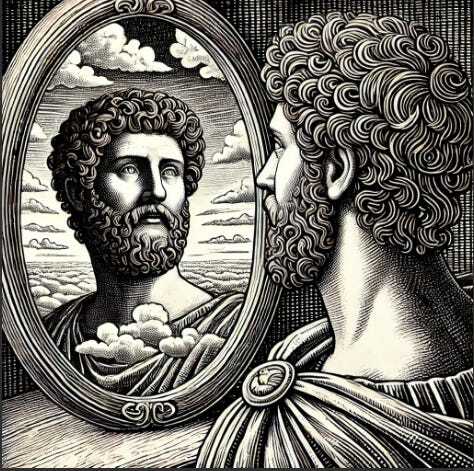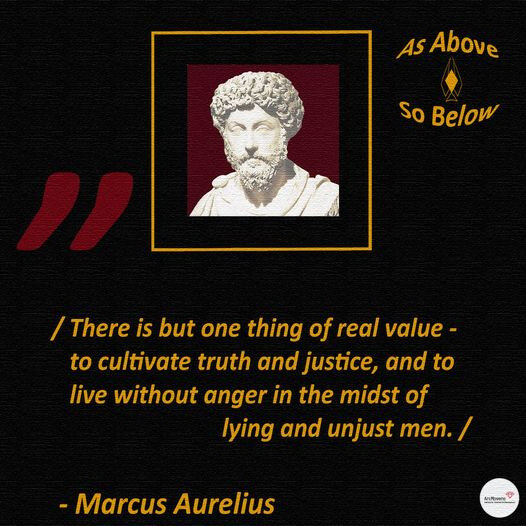Marcus and Me

“And what is good, Phaedrus,
And what is not good—
Need we ask anyone to tell us these things?”
Robert M. Pirsig, Zen and the Art of Motorcycle Maintenance
I will not hide my biases and concerns. With a month to go before our Consequential Presidential Election, I look at our candidates and I wonder—as many of you wonder—how one of them could be be so utterly bereft of compassion, of empathy, of any kind of moral scruple? How is it possible to live on this planet for 78 years, caring about no one and nothing beyond your own appetite for attention, money, sex, and power? It bothers me when I look at someone like this who is a mere citizen, but it really worries me when I’m looking at a presidential candidate.
How can millions of people see Donald Trump as the Greatest Good for this nation, when his path to power requires him to set people against each other in terminal, tribal warfare, and when his focus is so relentlessly and persistently on what the world owes him, personally?
Is he just a narcissistic sociopath, and it’s all mere pathology? Or is he, in some ways, the apotheosis of the Baby Boom Generation, the Me Generation(s), the belief that “self-actualization” is more important than faith, family, friends, customers, country, the environment…anything outside of Self?
“Ask not what your country can do for you—ask what you can do for your country.” Or, you know…whatever.
We’re doing something wrong, people.
Tom Nichols has an important piece in The Atlantic about George Washington: the kind of man and leader he was, and why he mattered so much at a critical time in our young country’s history. It’s easy, perhaps, to do a hit job on Donald Trump by comparing him to the Father of Our Country. But Nichols’ deep dive into Washington, the man, is instructive, because it raises questions about the idea of character and where it comes from.
George Washington did not emerge from the womb as a moral and principled man, any more than he was born knowing how to lead an army. He learned those things, as we all do. He was raised quite deliberately to believe in public service and in private restraint. Those were qualities—virtues—deemed important and included in his formal education.
Thomas Ricks has a fascinating book about the schooling of young Washington, Adams, Jefferson, and Madison. The four First Presidents were raised and educated in very different colonies, in very different social classes, in very different families. But they all learned some of the same things. Whether they learned at home or in a schoolhouse, their early education was steeped in antiquity. Each of the four First Presidents was required to learn Latin so that they could read contemporaneous accounts of life, war, and politics in the Roman republic and empire. Moral education came from the family and the church, of course, but it also came from ancient philosophers. Much of that philosophy centered on the Stoics. This is not surprising, because the four pillars of Stoicism eventually became the four cardinal virtues of Christianity, thanks, in part, to Thomas Aquinas.

In the minds of those 17th and 18th century generations, progress was real and linear and inexorable: the Greek world led to the Roman world, which led to the Christian World, which led to this New World—and each world taught and informed the one that followed, to enhance and perfect it. It’s not surprising that, in his insistence on retiring from the presidency and returning to his farm, George Washington was compared to Cincinnatus. He was raised, to some extent, to be a Roman statesman.
Stoicism is big, these days. You can even sign up for a daily newsletter of stoic (or allegedly stoic) wisdom. Everyone’s favorite exemplar of those old ways is Marcus Aurelius, who was as close to a Philosopher King as most of us know. His Meditations are easier to read than most books of philosophy—probably because they were written as journal entries and personal reminders, not as treatises to be taught by professors. Even if you’ve never read the book, you can find countless pithy quotes in every corner of the Internet, many of them adorned with his picture.


Of course, as with all quotes on the Internet, you need to be careful and do a little due diligence before you share things. One of my favorite quotes turns out to be from Tolstoy, not Marcus ("The object of life is not to be on the side of the majority, but to escape finding oneself in the ranks of the insane"). It’s still a great sentiment.
There are so many fake quotes from Marcus Aurelius that a professor had to make a YouTube video about them. So, in the spirit of the Romans: caveat emptor.
Marcus Aurelius first came to my attention many years ago, when the Indigo Girls released the song, “Galileo,” from their album, Rites of Passage. Someone—I’ve forgotten who—told me that he thought two lines from the chorus (“How long ‘til my soul gets it right? / Can any human being ever reach that kind of light?”) were either a sly reference to, or simply inspired by, the philosophy of the Roman emperor.
Intrigued, I went out to a book store and got a copy of the Meditations. At the time, all I could find was a fairly stuffy, formal, Victorian-era translation, which made connecting the dots a little complicated. But when you look at more modern translation, you can see what that someone-I’ve-forgotten was thinking:
To my soul:
Are you ever going to achieve goodness? Ever going to be simple, whole, and naked—as plain to see as the body that contains you? Know what an affectionate and loving disposition would feel like? Ever be fulfilled, ever stop desiring—lusting and longing for people and things to enjoy? Or for more time to enjoy them?
Meditations, 10,1. Translated by Gregory Hays
When I was growing up, I thought Stoicism (uppercase or lowercase) meant being emotionless—repressing all feelings; suffering in silence. Basic, dumb, old-fashioned, 1950s-style masculinity. Or that it was nihilistic—telling us to accept whatever comes, because you can’t change anything in the world. But it’s none of those things.
Stoicism asks you to reflect on the things of the world that you can affect and the things you can’t, and to put your energy and attention only on the former. It’s not about surrender; it’s very action-oriented (as any philosophy attractive to an emperor would have to be). It just cautions you to be realistic about causes and effects—realistic about what you can influence and change. To the Stoics, other people’s actions are outside of your control, but your responses to those actions are yours entirely. No one can actually hurt you, they said; you allow yourself to be hurt. You have the power to choose. What other people do is of little concern to you, in the end. It’s what you do that matters.
It’s a great rebuke to the culture of grievance that so many of us seem to be soaked in, these days, where we spend our hours rehearsing all of the wrongs that have been done to us and whining about how little we can do with our lives because of it, other than plotting revenge. To Marcus, the best revenge is simply refusing to be like the people who wronged us.
I love that Big Idea: what others did to us is of little concern; it’s what we do that matters. It urges us to action, not surrender. It tells us to own every bit of our lives. It tells us that being broken-hearted is all right, sometimes—important, even—but that it’s our choice to let our hearts be broken. And that it’s on us to decide what to do next. The sentiment reminds me of this moment from The Lord of the Rings which resonated with so many people when the movies came out in the years after the terrorist attacks of 9/11:

The Stoics were pretty realistic about mortality, too. They encouraged us to keep death somewhere in our peripheral vision at all times, as a reminder that “you could leave this life at any moment.” To be gloomy and depressed about life? No—to relish it and make the most of it. To “enjoy every sandwich,” as Warren Zevon put it, when he knew his last ride was coming to pick him up.
The Greeks and Romans of various philosophical schools spent a lot of time wondering what ideas like “goodness” and “happiness” meant, and what the best way to achieve those things might be. In a world where we are constantly bombarded with enticements to buy and take and use—to entertain and enjoy ourselves so that we can be truly happy—those ancient questions remain pretty important. What is our real purpose here on earth? Is it better to pursue being happy or being good? Is it enough to enjoy every sandwich?
Aristotle (not a Stoic) definitely thought there was more to life than the sandwich. In the Nicomachean Ethics, he said:
Happiness is not found in amusement; for it would be absurd if the end were amusement, and our lifelong efforts and sufferings aimed at amusing ourselves.
You remember Aristotle:
Amusement and comfort were fine, he believed. We need those things in order to live our lives, but they’re not the ultimate aim of life. As he said, “He is happy who lives in accordance with complete virtue.” Virtue, to him, was the goal. And virtue was not simply a collection of feelings; it was a set of actions. Public actions. Happiness meant having the things that enabled you to do good in the world.
Do we still believe that the happy life is one of virtue and contribution to society? If so, where in our modern world do we teach that? The message of modern Consumer Capitalism seems to be: you owe nothing to anyone but yourself; buy more stuff and have more fun. And it’s a pretty relentless message.
I think most parents would reject the idea that TAKING and USING were the highest values in the world, and would want something different getting through to their children as character education. But where does that something else come from? Does the task fall entirely on the family? Should religion be expected to carry the burden? What if you’re not part of a religious family or community? Should it be part of the school curriculum? Whose responsibility is moral and civic education?
There are people who sincerely believe that without the threat of divine punishment, people cannot be expected to be good, but I know plenty of atheists and agnostics who have found a way to restrain themselves from murderous rampages. If you are part of a religious tradition that teaches moral principles and civic virtues, fantastic. But if you’re not…what are those other avenues of learning?
And I do mean civic virtues here, not simply “civics,” the class where we learn how a bill becomes a law. Where do we learn the habits of heart and mind, and the public behaviors, that enable us to live together in a democratic society?
Look, I’m old. I grew up with stuff like this on TV:
The question matters to me as a citizen and a father, of course, but also as an educator. Previous generations saw moral and civic education as part of the role of the school. That’s not universally accepted anymore, because public schools have lost public trust in some areas, and we’ve also lost confidence and consensus around what we should be telling our kids.
I’ve seen a drive lately to bring back the idea of “Classical Education.” This exists mostly within religiously and politically conservative circles. You can find a variety of actors and agendas in this space, mostly in the charter school movement. You may find some of them innocuous and even inspiring; you may find others of them leaning towards White Supremacy and American Nativism. But if you’re on the Left, or even in the political center, it’s worth looking at what some of them are doing, and asking yourself whether any of it is speaking to something of value that, perhaps, we’ve lost.
The Great Hearts network of schools, currently in Arizona and Texas, publishes this as their purpose and philosophy:
Liberal education consists of cognitive, emotional, and moral education—thinking deeply, loving noble things, and living well together. We believe, with Plato, that the highest goal of education is to become good, intellectually and morally.
“Thinking deeply, loving noble things, and living well together.” How much of that is going on in our public schools today? Do our schools think it is their mission to make their students “good, intellectually and morally?” Some try. But is there agreement within their communities about what that would entail? Is there agreement between communities?
Dig into the Great Hearts English curriculum, and you’ll find their reading list to be Whiter and older and more male than in many public schools today. Dig into their history curriculum, and you’ll find far more focus on American history than world history, and not much of anything about the non-Western world. Progressive in tone? Hardly. Multi-cultural in breadth? No. It’s not what I would have wanted my kids to study in school—or, at least, not solely that.
But where they may not go broad, they do go deep. Their “Humane Letters” course, required for all high school students, is a hardcore seminar filled with genuinely complex, meaty texts and extensive Socratic dialogues designed to unpack the meanings and purposes of those “works of prose, fiction, political theory, epic poetry, philosophy, autobiography, drama, and selections from Jewish and Christian scriptures.”
Do I wish that every high school senior had access to that kind of a class? I do.
The curricular throwback to the 1950s might not be your family’s cup of tea. It’s not mine. But why should that be the only approach? Is “thinking deeply, loving noble things, and living well together” only a value on the political and religious Right, or should these things be the true aim of schooling?
Do schools have a role in making young people “good?” Would we even be comfortable letting them play such a role? And what shared philosophy or worldview would guide that shaping-of-good-people?
Donald Trump is the extreme example of what you get when you raise a child without ethics, morals, or focus on the good of the group. He is a raging, untamed Id, out for himself, only and always. That’s his family’s fault, and the fault of a mental disorder. But at some point, education also let him down.
What’s the point in learning how to read and write and do sums, if you don’t also learn how to live a happy life, as Aristotle defined it: a life among people, a life that teaches and enables and empowers you do good things for and with those people—to make a world together that’s worth living in?
I know, I know—the people who hoot and cheer for those who make us hate each other—who are okay with burning down the country as long as they can rule the ashes—they’re not breaking my heart; I’m allowing my heart to be broken. That’s on me. But Joe Biden talked a lot in 2020 about needing to heal the soul of America, and a lot of us agreed with him. So, how long ‘til our souls get it right?
Scenes from a Broken Hand
- Andrew Ordover's profile
- 44 followers



